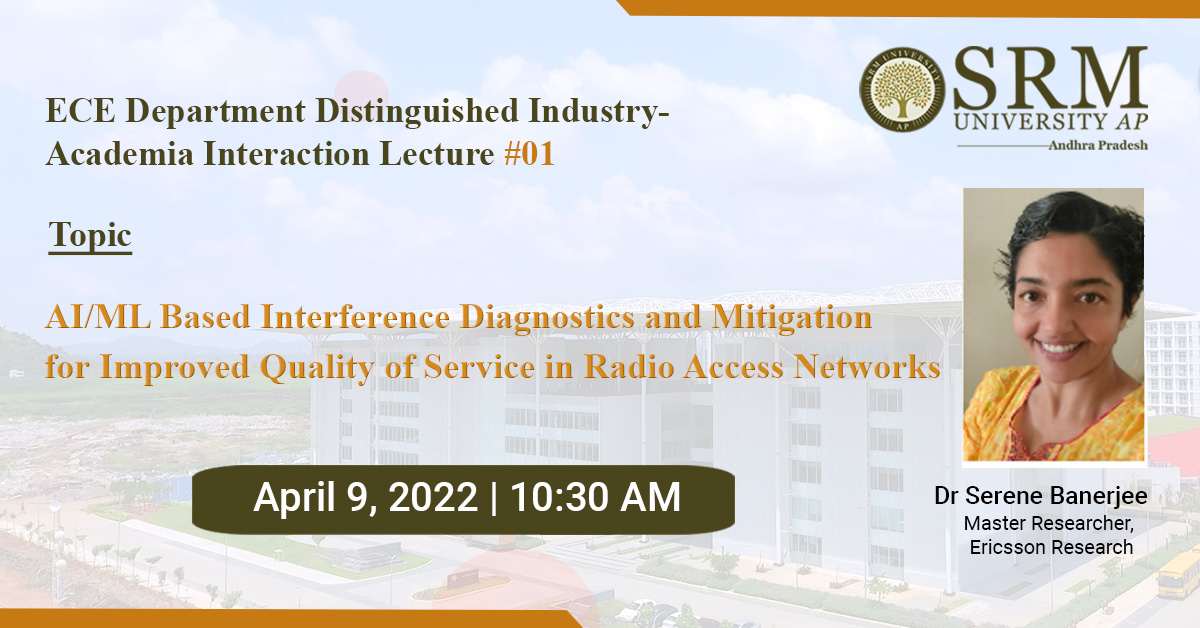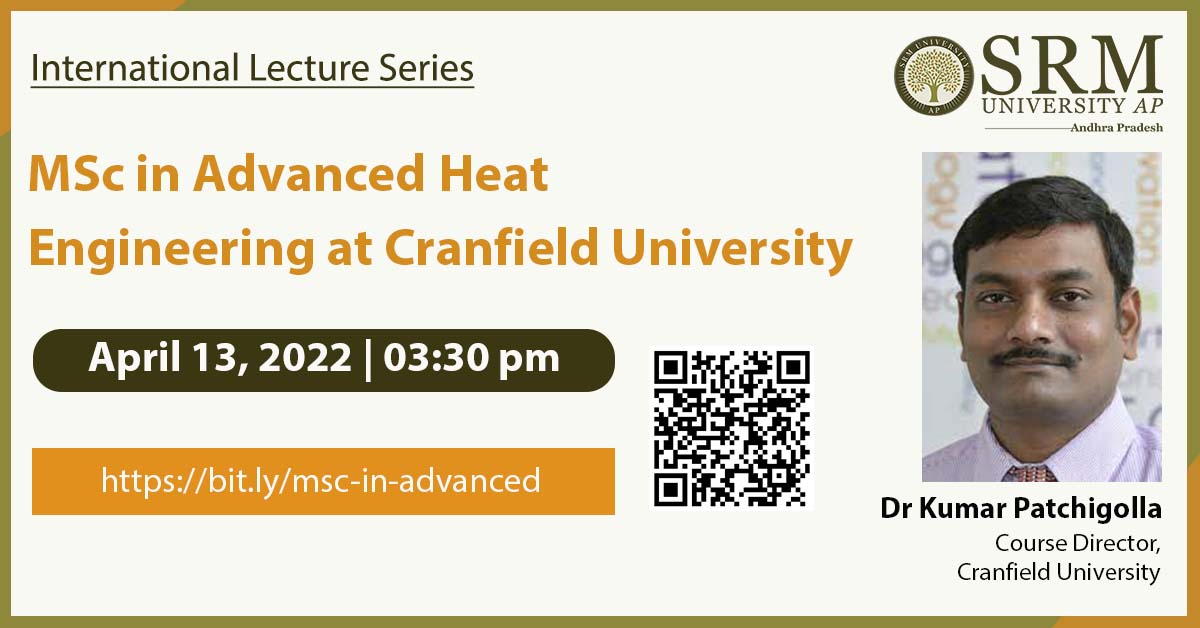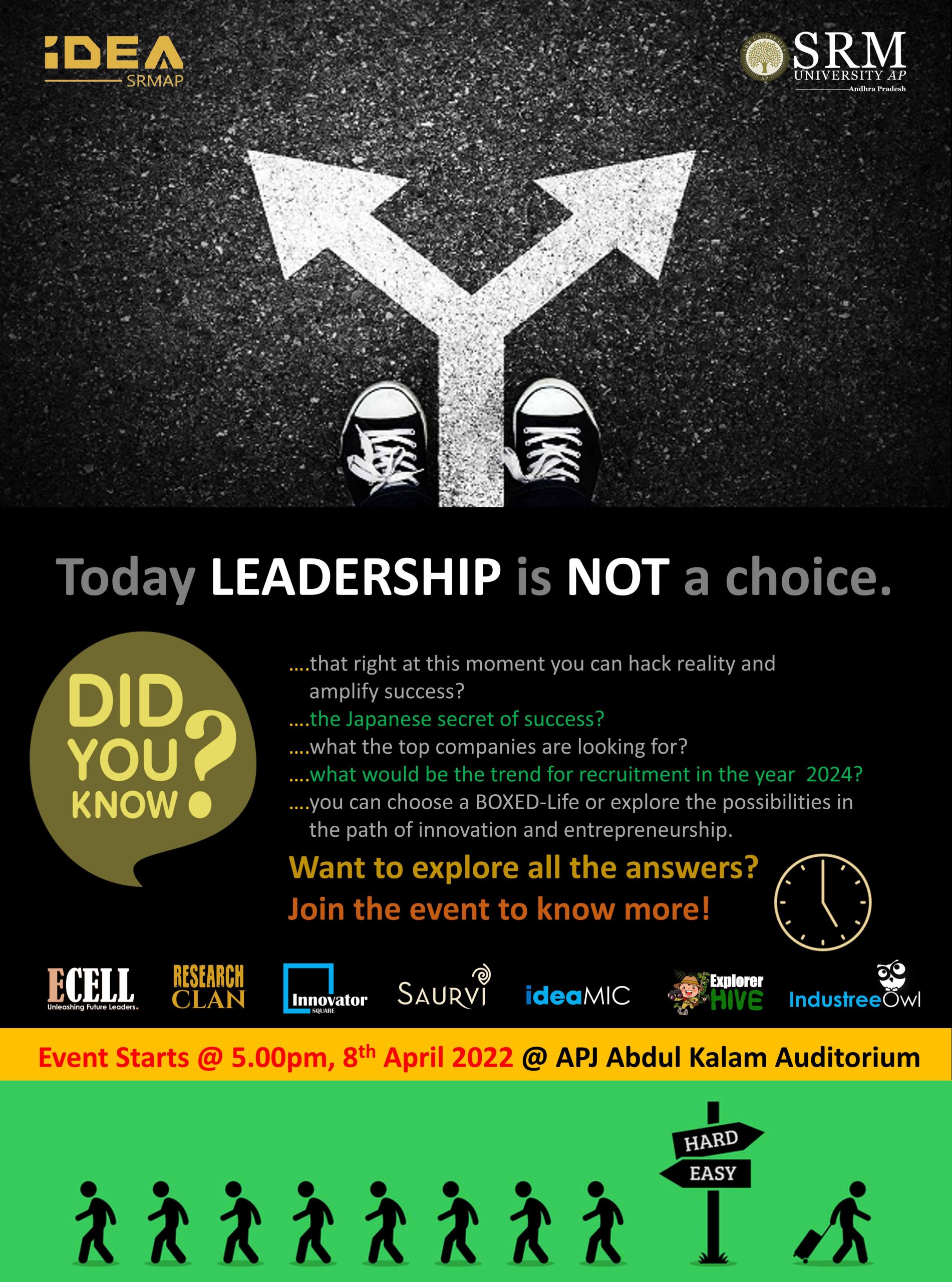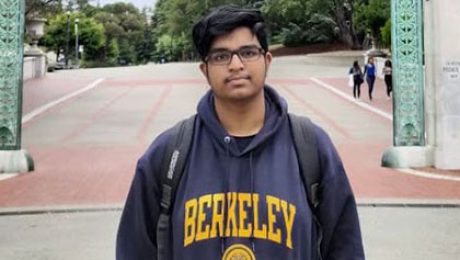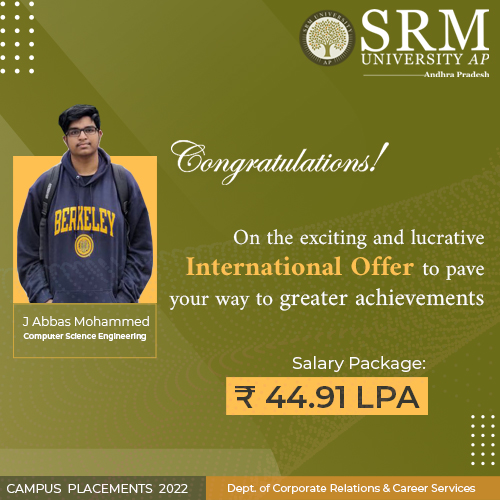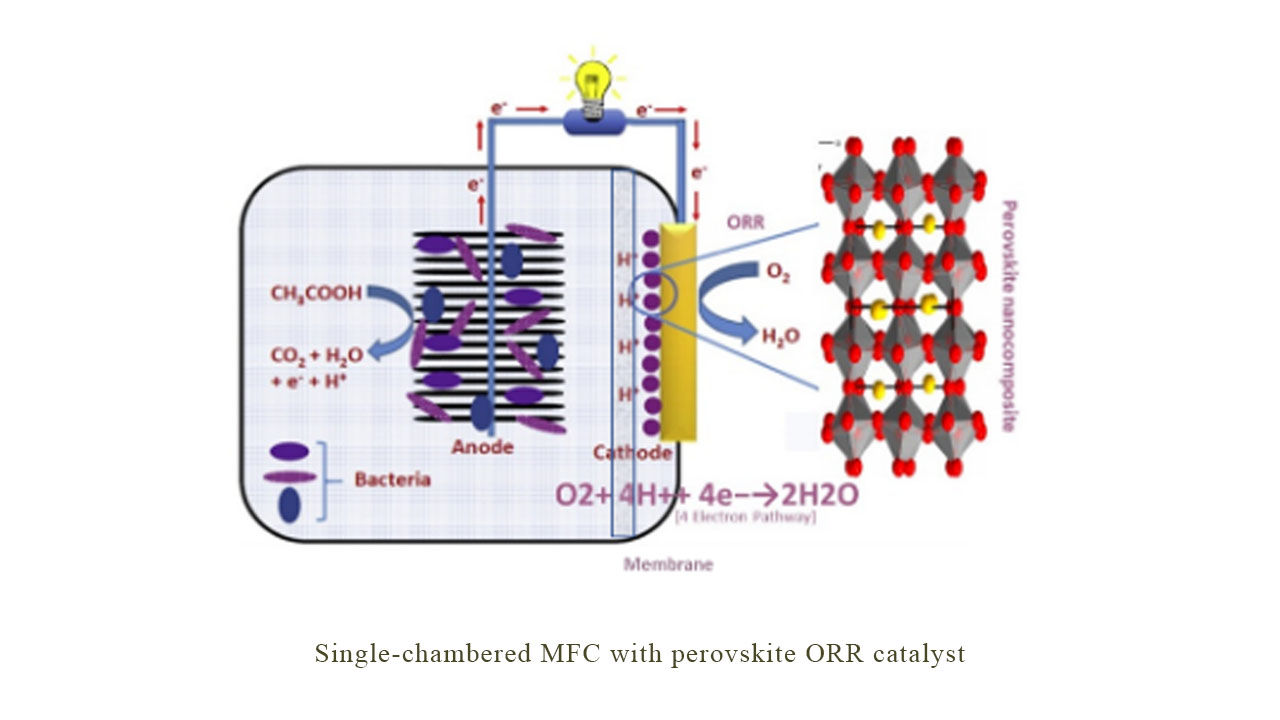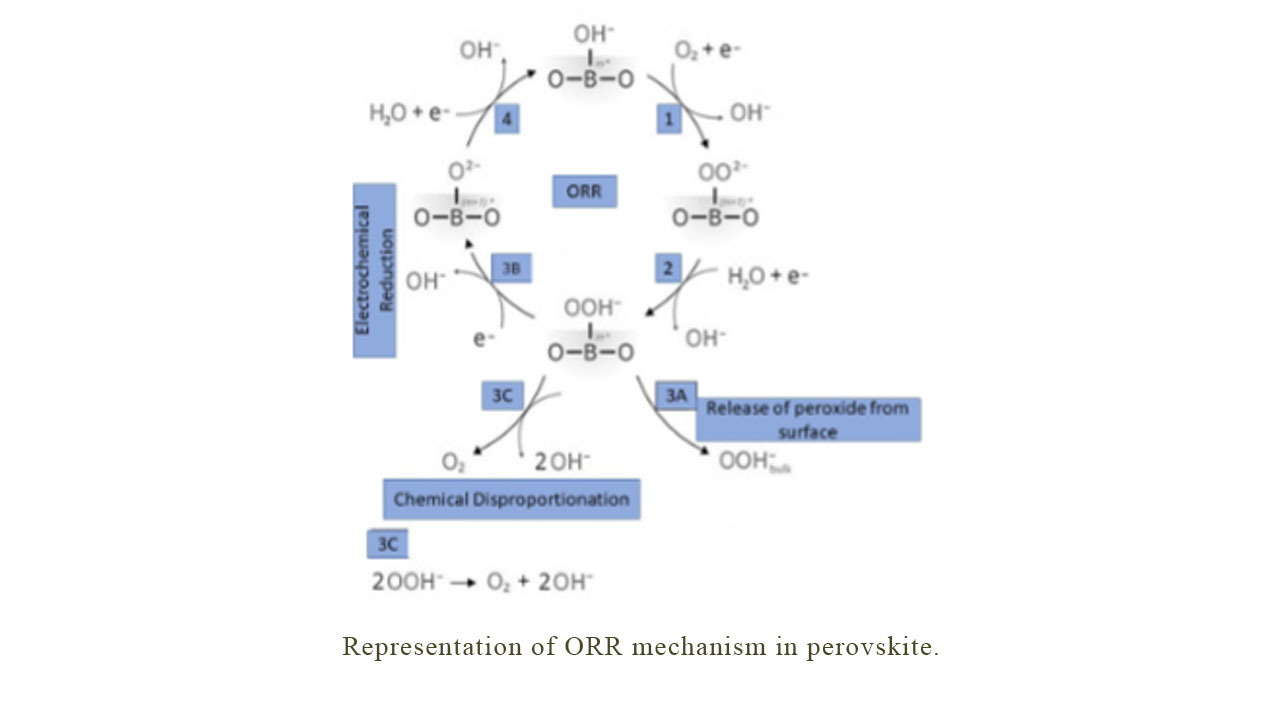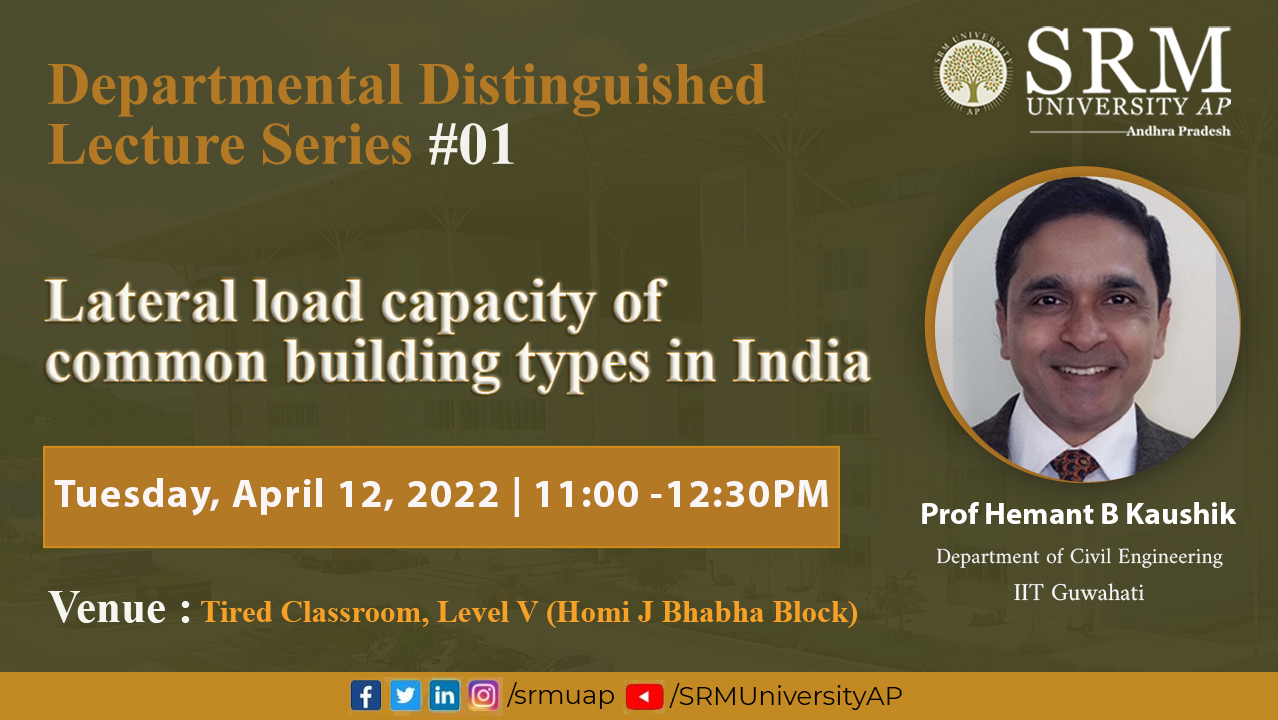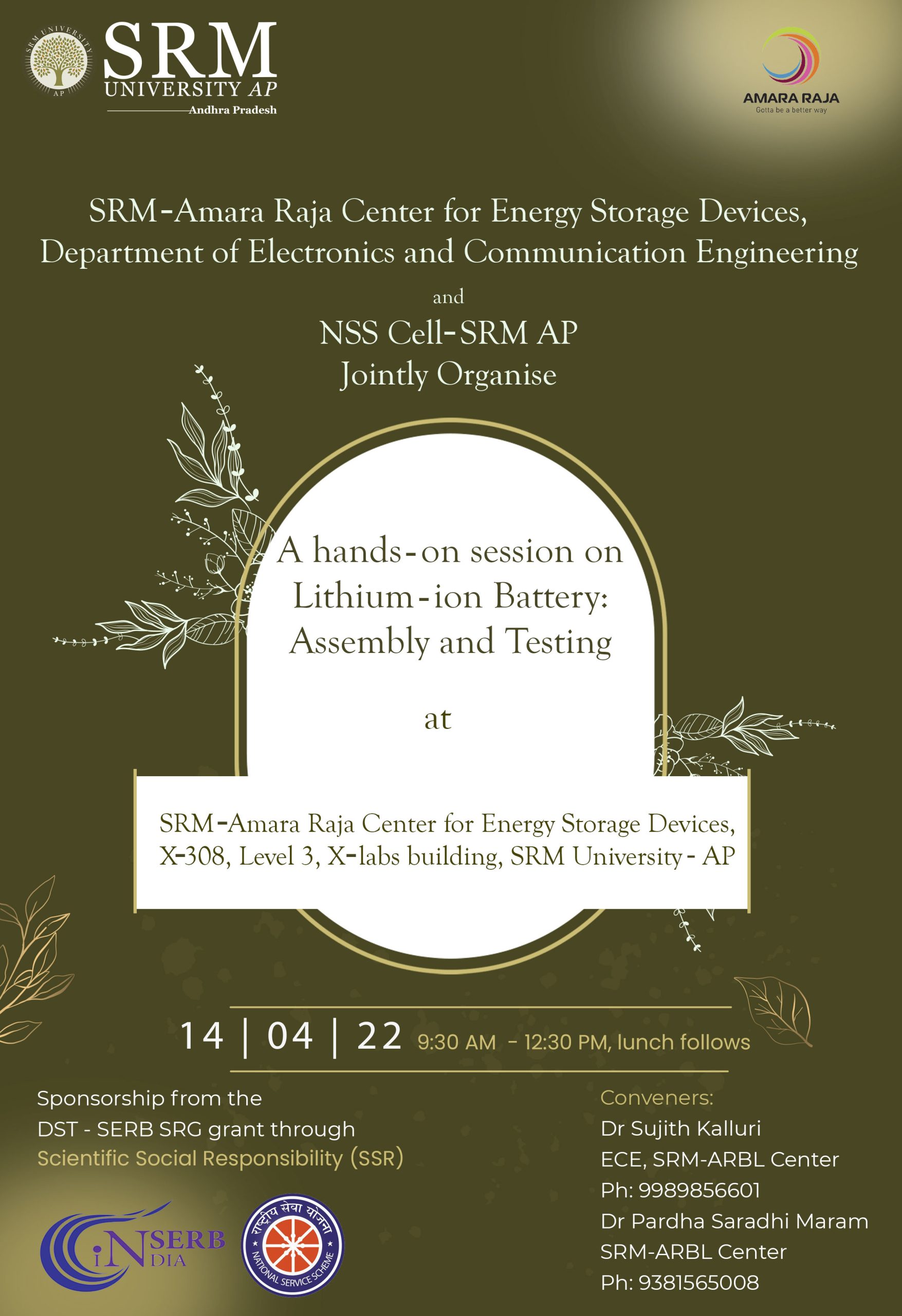AI/ML algorithms for radio access networks
The Department of Electronics and Communication Engineering is hosting the first instalment of the Distinguished Industry-Academia Interaction Lecture in the ECE DDIAL series. The event is scheduled on April 9, 2022, at 10.30 am. Dr. Serene Banerjee, Master Researcher, Ericsson Research, will be the keynote speaker. She will deliver a talk on the topic ‘AI/ML Based Interference Diagnostics and Mitigation for Improved Quality of Service in Radio Access Networks’.
Abstract of the Talk
For coverage and capacity optimization, Uplink Power Control is one of the key steps, in addition to antenna tilting and Downlink Power Control. For self-organizing networks, automated algorithms for Uplink Power Control are a necessity. However, Uplink Power Control affects the noise in the neighbouring cells. It is important to detect this interference to monitor uplink noise. Uplink noise due to power control manifests as static interference in the channel. The current state-of-the-art baseline model is based on regression models. We have proposed automated detection of static interference in the uplink channel of cells based on machine learning models. We have evaluated the same on customer data on LTE networks with high accuracy. The detected cells are subsequently used to correct the nominal power parameter through a proposed teacher-student model based on the primary cell and its neighbours. This approach shows better performance than the state-of-the-art baseline methods. The dual of static is dynamic interferences and can be attributed to traffic load, Passive Intermodulation (PIM) and thermal noise, etc. PIM identification is a major component in troubleshooting modern wireless communication systems. The introduction of carrier aggregation has increased PIM occurrences. Current state-of-the-art approaches include manual rule-based and hardware-based debugging. These approaches can detect the occurrence of PIM, long after the event occurrence and result in incurring incidental costs. We propose an ensemble of time series-based machine learning and signal processing approaches that can automatically identify PIM in real-time by analyzing Key Performance Indicators (KPI) of the primary cell and its nearest neighbours. We validate our results for various environmental conditions in data available from LTE and 5G consumer networks. We have further extended the work to multi-frequency time series to handle finer time granularities and detect PIM anomalies in an online learning setting. We further propose a self-supervised reinforcement learning approach to predict PIM related anomalies before it happens. We forecast environmental conditions that give rise to PIM based on offline historical data and model to predict future occurrences. Experimental results are on real-world datasets comprising 50,000+ cells which have shown to accurately predict PIM 60% of the time. To the best of our knowledge, this is the first work, where we are able to predict PIM anomalies before they happen. Post PIM-identification, we propose a binary search-based solution that is amenable to real-time implementation. We show through simulations that this search in tandem with a reinforcement learning-based solution can dynamically mitigate and cancel PIM. Results show that the number of steps to converge, to identify and mitigate the PIM in uplink frequency is reduced by a large factor. To summarize, our contributions include using machine learning algorithms for: (1) robust interference classification, (2) demonstrating p0-nominal recommender as teacher-student model, (3) a times-series analysis-based PIM identification, (4) extending the approach to multi-frequency time series, and for online learning, (5) demonstrating a self-supervised reinforcement learning approach to predict PIM anomalies before they happen, and (6) mitigating PIM, in spite of environmental unknowns, by employing binary search in conjunction with ML/RL-based approaches.
About the Speaker
Serene Banerjee, Master Researcher, Ericsson Research, has 17+ years of industrial experience after completing her PhD from the University of Texas at Austin, under Prof Brian L Evans in 2004. She has completed BTech(H) in Electronics and Electrical Communications Engineering from IIT Kharagpur in 1999. At Ericsson, she is focusing on developing AI/ML algorithms for Radio Access Networks. Prior to Ericsson, she has worked with Texas Instruments, HP, and Johnson Controls. She has 23 peer-reviewed publications, 9 granted patents, and several pending.
Join the webinar for an informative interaction with Dr Serene Banerjee.
- Published in Departmental Events, ECE Events, Events
MSc in Advanced Heat Engineering at Cranfield University
The heat and power industry is undergoing a major transformation, and multinational enterprises must adapt to satisfy ever-increasing present and future demands. The Office of International Relations and Higher Studies at SRM University-AP is organising a lecture titled “MSc in Advanced Heat Engineering at Cranfield University” to educate the students about the importance, scope and opportunities of the field. Dr Kumar Patchigolla, Course Director at Cranfield University will illuminate the participants on the topic on April 13, 2022, at 03.30 pm.
All are invited to participate in the lecture organised as a part of the International Lecture Series.
About the Speaker
Dr Patchigolla joined Cranfield University in 2009 as Lecturer in 2012, Senior Lecturer in 2017 and Reader in 2020. During this period he is involved in the demonstration of low-temperature heat storage (rock bed), thermal driven absorption chiller (Li-Br), combustion (fluidized, pulverized), gasification (fixed, fluidized), the capture of CO2 (Chemical/Calcium looping) and CO2 pipeline and shipping transport facilities, evaluating the effects on component durability and gas cleaning requirements of systems using a wide range of solid fuels. These include biomasses, waste and sewage sludge as well as coal either alone or in different co-fired combinations and supervision of research activities using the Pilot Scale Advanced Capture (PACT) facilities.
- Published in Events, International Relations, IR-Events, Webinars
Ushering the next era- innovation, leadership & entrepreneurship
Once upon a time “Kodak” (Kodak Croma was the leader in camera manufacturing) said – “I am the leader!!! No digitalization can impact me. I am too big and powerful for anyone and anything to be replaced!!!!…. I am invincible!”. Today “Kodak Croma” has become a fossil. The new generation is not even aware of the name.
Every innovation is the beginning of a new era. It also ushers a million changes that will have a radical impact on all aspects of life. Therefore, it is inevitable to keep abreast of all the latest happenings in the changing times as every new change opens a new world of opportunities. Unless the present generation is equipped to embrace the heralding revolution, they are locked out of infinite avenues that will lead them to a brand-new life.
The Department of Entrepreneurship and Innovation is organising an induction programme ‘Ushering the Next Era- Innovation, Leadership & Entrepreneurship’ for the students of SRM University- AP on various initiatives and activities on leadership and entrepreneurship. The programme intends to give a brief overview of the contemporary innovations in the business landscape and facilitate them to transform in tune with the recent developments. They are also given an opportunity to meet some of the budding entrepreneurs in the field to derive inspiration and orient themselves accordingly. Grab every opportunity that comes your way and transform yourselves into the leaders of tomorrow.
Date: April 8, 2022
Time: 5.00 pm IST
Venue: APJ Abdul Kalam Auditorium, X-Lab, SRMAP
You can also join us virtually for this exciting session to explore the pioneering developments in the field.
- Published in Events, IDEA Events, Webinars
J Abbas Mohammed grabbed a staggering offer of CTC 44.91 LPA
J Abbas Mohammad was in a state of absolute euphoria as the news reached him. He has been placed with Predli, a top-performing AI company, with a staggering offer of CTC 44.91 LPA. With one more achievement to flaunt, SRM is surging ahead with an endless list of placement offers and achievement stories. Abbas is a final year student of the Department of Computer Science Engineering who has already demonstrated his calibre by grabbing a seat at UC Berkeley through the Semester Abroad Programme. His sheer will and dedication have always helped him break the records and fly to further heights.
SRM University-AP happened to be the perfect place that shaped him up to pursue the career of his dreams. Our collaboration with leading enterprises in the world turned out to be an excellent avenue for many to walk ahead to a horizon of opportunities. The Department of Corporate Relations & Careers Services is also doing an amazing job in training the students and encouraging them to apply for the best available prospects. Let us listen to Abbas as he pours out his excitement.
“I am truly delighted to have received this high-paying placement offer. And all of this became possible with the exposure I received from my university. I kept abreast of the latest technologies in the software industry and applied them through practical projects as part of our co-curricular activities in classrooms and university labs such as the Next Tech Lab. The experienced faculty and specially curated curriculum we follow here will always give an extra edge to the students. I am indeed thankful to Dr Sujith Kalluri and Dr Priyanka for assisting me on several occasions”, he said.
“It is the Semester Abroad Program at UC Berkeley, which allowed me to build a strong international networks, that eventually led to this offer. I’m immensely fortunate to land the job of my dream. In future, I hope to advance professionally and adapt to greater leadership roles with the goal of starting my own venture”, remarked Abbas.
- Published in CR&CS, CR&CS NEWS, CSE NEWS, Departmental News, News, Students Achievements
Introducing perovskite-based catalyst for microbial fuel cell
Microbial fuel cells (MFCs) are biochemical systems producing green energy through the microbial degradation of organic contaminants in wastewater. The Oxygen Reduction Reaction (ORR) that takes place at MFC cathode decides the overall output of energy generation. Hence, the selection of ORR catalyst becomes pivotal in MFC fabrication for its efficiency and cost effectiveness. Gopa Nandikes P, PhD Scholar, Department of Environmental Science, proposes perovskite-based nanocatalyst as an excellent replacement to Platinum in his paper “Perovskite-Based Nanocomposite Electrocatalysts: An alternative to Platinum ORR Catalyst in Microbial Fuel Cell Cathodes”. The paper is published in ‘Energies Journal’ having an Impact Factor of 3.04.
The paper comprehensively summarises all the studies conducted with perovskite-based ORR catalyst in MFC, its unique reaction mechanism and the synergistic effect with carbon. The paper also throws light into various challenges and prospects to further improve the ORR activity of perovskite-based catalysts.
Abstract of the Research
Microbial fuel cells (MFCs) are biochemical systems having the benefit of producing green energy through the microbial degradation of organic contaminants in wastewater. The efficiency of MFCs largely depends on the cathode oxygen reduction reaction (ORR). A preferable ORR catalyst must have good oxygen reduction kinetics, high conductivity, and durability, together with cost-effectiveness. Platinum-based electrodes are considered a state-of-the-art ORR catalyst. However, the scarcity and higher cost of Pt are the main challenges for the commercialization of MFCs; therefore, in search of an alternative, cost- effective catalysts, those such as doped carbons and transition-metal based electrocatalysts have been researched for more than a decade. Recently, perovskite-oxide based nanocomposites have emerged as a potential ORR catalyst due to their versatile elemental composition, molecular mechanism, and the scope of nanoengineering for further developments. In this article, we discuss various studies conducted and opportunities associated with perovskite-based catalysts for ORR in MFCs. Special focus is given to a basic understanding of the ORR reaction mechanism through oxygen vacancy, modification of its microstructure by introducing alkaline earth metals, electron transfer pathways and the synergistic effect of perovskite and carbon. At the end, we also propose various challenges and prospects to further improve the ORR activity of perovskite-based catalysts.
- Published in Departmental News, ENVS News, News, Research News
Lateral load capacity of common building types in India
The Department of Civil Engineering is organising the first physical lecture as part of the Departmental Distinguished Lecture Series on April 12, 2022 from 11.00 pm to 12.30 pm. Prof Hemant B Kaushik from the Department of Civil Engineering, IIT Guwahati is the distinguished speaker of the event. He will deliver a talk on the topic “Lateral load capacity of common building types in India”. This talk will provide detailed insights into the seismic behaviour of different building types in India. Various experimental results of full-scale model tests on shake tables and actuators will also be presented.
Speaker’s Profile
Prof Hemant B Kaushik is currently working at IIT Guwahati in the Department of Civil Engineering and Centre for Disaster Management and Research. He is also the Associate Dean of Academic Affairs and the Head of the Centre for Educational Technology. His research areas broadly include: earthquake resistant design of structures, nonlinear behavior of structures, retrofitting of structures, seismic vulnerability assessment of structures, earthquake damage surveys etc. He was the recipient of the INAE Young Scientist Award in 2010 and 2013. He also received the David Fischetti Award in 2019, presented by the Preservation Engineering Technical Committee (PETC) of the Association for Preservation Technology International (APT), USA. The award recognises an outstanding article in a peer-reviewed publication that advances the field of conservation engineering. Prof Kaushik is also a member of the Earthquake Engineering Sectional Committee, CED 39, Bureau of Indian Standards. He also holds membership in several professional bodies like Earthquake Engineering Research Institute (EERI), USA, American Society of Civil Engineers (ASCE), USA, The Masonry Society (TMS), USA, Indian Society of Earthquake Technology (ISET), India and Institution of Engineers, India. He has contributed several post-earthquake reconnaissance study reports and papers in reputed journals and conferences.
All are invited to join this informative lecture on Tuesday, April 12, 2022, from 11.00 pm to 12:30 pm.
- Published in Civil Engg events, Departmental Events, Events
E-Cell organised induction programme on entrepreneurial leadership
The Department of Entrepreneurship and Innovation organised an induction programme, “Ushering the Next Era- Innovation, Leadership & Entrepreneurship”, to give the students a comprehensive overview of the emerging possibilities in entrepreneurship. Various students who have successfully initiated their own start-up ideas have also shared their experiences.
Udayan Bakshi, Associate Director- Entrepreneurship, introduced the students to the country’s business landscape and rendered them a brief picture of the start-up ecosystem of India. Substantiating his arguments using facts and figures, he instigated the students to develop an innovative spirit and don the role of entrepreneurs capable of transforming the face of the nation.
Prof B V Babu, Dean- School of Engineering and Sciences, presided over and spoke about the legacy of the university. He also reminded the students of the ample avenues left open for students to explore and experience. “We aspire to offer a wholesome learning experience to our students through a gamut of courses ranging from engineering to fine arts and management”, he said. When it comes to entrepreneurship, there are pioneering ventures like Hatchlab Research Centre and Next Tech Lab to support and motivate young researchers who can promote the commercial research culture.
Prof Prakash Jadhav, Head- Innovation, Design and Entrepreneurship Academy (IDEA), enlightened students on the inevitability of trying their hands at entrepreneurship as the country demands more job providers than job seekers to satiate the needs of the growing population. He also coaxed the students to contribute to the Make in India vision by exhibiting their innovatory leadership skills.
A few of our students, Lucklin Medimpudi, Jathin, Divi Gnanesh, Lakshman Tatikonda, Manaswini Surusomayajula, and Himansh Mudigonda, who have displayed their entrepreneurial acumen through ingenious start-up ideas went on to share their experiences and encouraged the students to become part of the E-Cell.
The session was later taken over by Manideep Surusomayajula who elaborated on various initiatives such as the student communities, exploratory competition, and the experiential learning platforms, the E-Cell has embarked on to train our students to perform to the best of their abilities in the industry. There are numerous platforms ranging from international collaborations to global mentorship programmes and women-led start-up initiatives for students to innovate themselves as individuals and as a team.
Mr Bakshi wrapped up the event by referring to the triumphant stories the SRM AP E-cell has witnessed. He reinstated the university’s vision to build strong professionals who can assume the position of entrepreneurial leaders and play a crucial role in nation-building. SRM AP aims to give rise to dozens of skilful professionals having the ability to motivate and inspire sweeping changes that can help the nation progress.
Forging ahead with the light of 44 years: India’s most impactful VC, Prof V S Rao
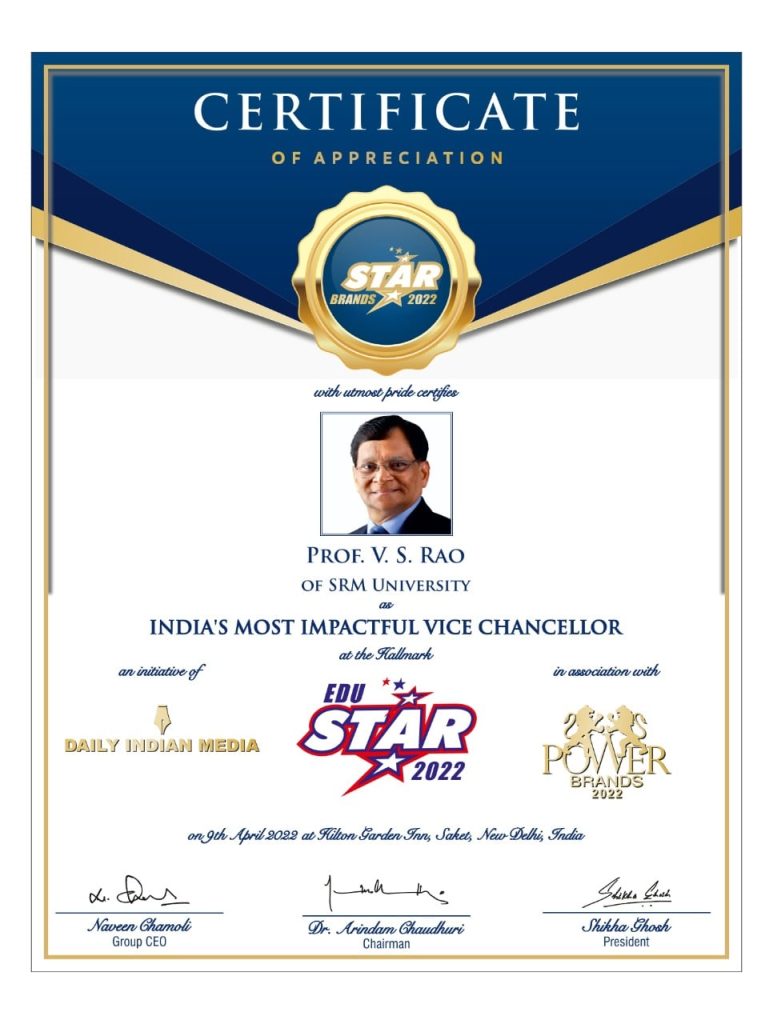
SRM University- AP is proud to announce that our Vice-Chancellor, Prof V S Rao, has been conferred with EduStar India’s Most Impactful Vice-Chancellor award. The prestigious award ceremony was held on April 9, 2022, in Delhi, hosted by Daily Indian Media and Star Brands. The event was organised to felicitate the “Most Impactful and Most promising Awards specifically for Vice Chancellors & Chancellors”, who have contributed to higher education in India. Prominent leaders of premiere institutions across India were recognised in the ceremony for their outstanding involvement in the field of education.
The prestigious gathering witnessed the participation of about 8% of the Vice-Chancellors of Indian private universities. The noteworthy guidance of these veteran leaders had an enormous impact in the domain of higher education.
Receiving the title award, Prof V S Rao thanked EduStar for recognising his contribution to the higher education industry. He expressed, “The education and training given at BITS Pilani made me what I am today. Receiving this award on the eve of 44 years of service in academics makes it more special. I feel proud to be associated with SRM University-AP, a university focused on research, innovation and entrepreneurship.”Prof V S Rao was one of the significant awardees among the Vice-Chancellors of various universities such as Lovely Professional University, Dy Patil University and many other elite institutions in the country.
“It is a moment of pride for the university to have our Vice-Chancellor awarded with EduStar India’s Most Impactful Vice Chancellor title. On behalf of SRM Group of Institutions, I congratulate Prof V S Rao for this achievement”, said Dr P Sathyanarayanan, President, SRM Group of Institutions.Dr Arindam Chaudhuri, the organiser of the award ceremony, shared his views and thoughts on the need for application-oriented education and emphasised the role of leaders of such universities who could make it happen.
A felicitation ceremony was organised in the university in honour of the respected Vice-Chancellor. Honourable Pro-Vice-Chancellor, Prof D Narayana Rao and Registrar, Dr R Premkumar, were also present at this illustrious occasion.
A hands-on session on lithium-ion battery: assembly and testing
Allowing students to explore more into their learning domain will invariably enhance their quest for knowledge. The more students are encouraged to experiment with problems, tools, and substances they will work with, the better prepared they are to face any challenge head-on. It is also a better rewarding alternative as against the conventional book learning method.
Taking the current scenario into account,imparting hands-on training on cutting-edge developments is an excellent exercise to inculcate scientific spirit in young minds. Such initiatives should be actively promoted to equip students on par with the fast-evolving technological realm. We are delighted to announce that the SRM-Amara Raja Center for Energy Storage Devices, Department of Electronics and Communication Engineering, collaborates with NSS Cell-SRM AP to organise a “Hands-on Session on Lithium-ion Battery: Assembly and Testing” with the sponsorship from the DST-SERB Start-up Research Grant (SRG).
Date: April 14, 2022
Time: 9.30 am to 12.30 pm IST
We invite all the interested students to become part of this invigorating initiative and make the best use of this opportunity to receive an enriching training session. The event is also followed by lunch for all the participants.
- Published in Departmental Events, ECE Events, Events
Accelerating research in the Quantum-dot Cellular Automata domain
The Department of Electronics and Communication Engineering is glad to announce that our PhD scholar, Mr Vasudeva Bevara and BTech students, Mr Shakamuri Narendra Chowdary and Mr Bolem Venkata Surendra Babu, published a paper titled ‘High performance 2n: 1: 2n Reversible MUX/DEMUX Architecture for Quantum-dot Cellular Automata’ in the international journal ‘Numerical Modelling: Electronic Networks, Devices and Fields (SCI Index)’ under the supervision of Dr Pradyut Kumar Sanki.
Abstract of the Research
Quantum-dot Cellular Automata (QCA) lead to fundamental changes in nanoscale technology. It promises small area, low power & high-speed structures for digital circuit design. This paper presents efficient low power structures of Reversible Multiplexer & Demultiplexer (RMD) modules based on the QCA technology. The simulation result shows that the proposed RMD modules have utilised less area & low power consumption. The simulation, layout & energy dissipation analysis of the proposed RMD module has been carried out using the QCA Designer-E simulation tool.
Essentially, CMOS is used as a well-known traditional technology in the design of the Very Large-Scale Integration (VLSI) circuits, which leads to the introduction of QCA as new nanotechnology to overcome the limitations of CMOS technology, such as material, physical, power, heat & economic challenges.
In reversible computation, the power dissipation occurs only when the computation is started or when the output is permanently stored. The reversible logic circuits are being investigated to prevent data loss in irreversible logic circuits. The reversible logic circuits provide zero loss of energy/information making the logic circuits the most suitable for QCA nanotechnologies. This has resulted in widespread interest in the design of reversible logic circuits based on QCA over the last few years.
In this paper, a modular 2n: 1 reversible multiplexer & 1: 2n reversible demultiplexer design in a single circuit is proposed. The 2:1 multiplexer & 1: 2 demultiplexer is realised in a single module i.e., 3 × 3 RMD. The 3 × 3 RMD is formed fundamental building block of the modular 2n: 1 reversible multiplexer & 1: 2n reversible demultiplexer design is extended to large RMD design.
Practical Implementations of the Research
This work can push forward research in the QCA domain and overcome the limitations of Complementary Metal Oxide Semiconductor (CMOS) technology. Soon the era of Beyond CMOS will start as the scaling of the current CMOS technology will reach the fundamental limit. QCA (Quantum-dot Cellular Automata) is the transistor less computation paradigm and viable candidate for Beyond CMOS device technology.
So, they have implemented the High Performance 2n: 1: 2n Reversible MUX/DEMUX Architecture for Quantum-dot Cellular Automata compared to other researcher works. In future, the research team would like to explore deeper into QCA technology and design efficient circuits which are small sized, with less cell count and less power consumption.
- Published in Departmental News, ECE NEWS, News, Research News


